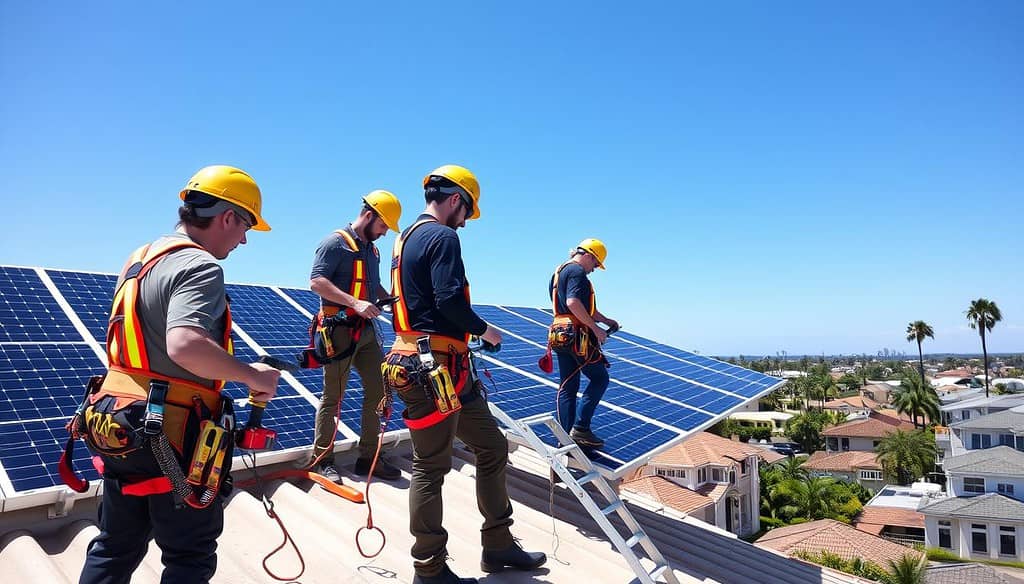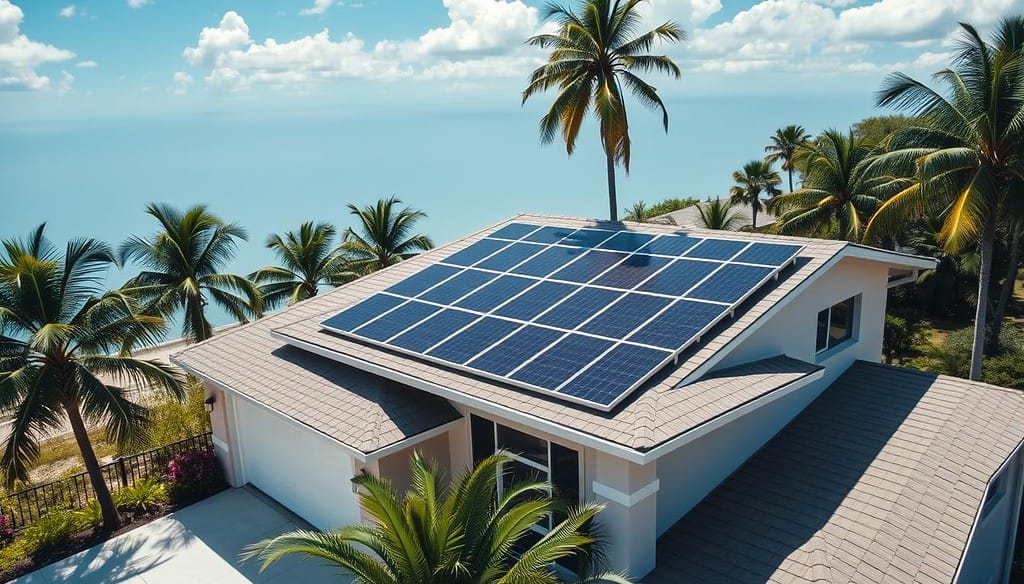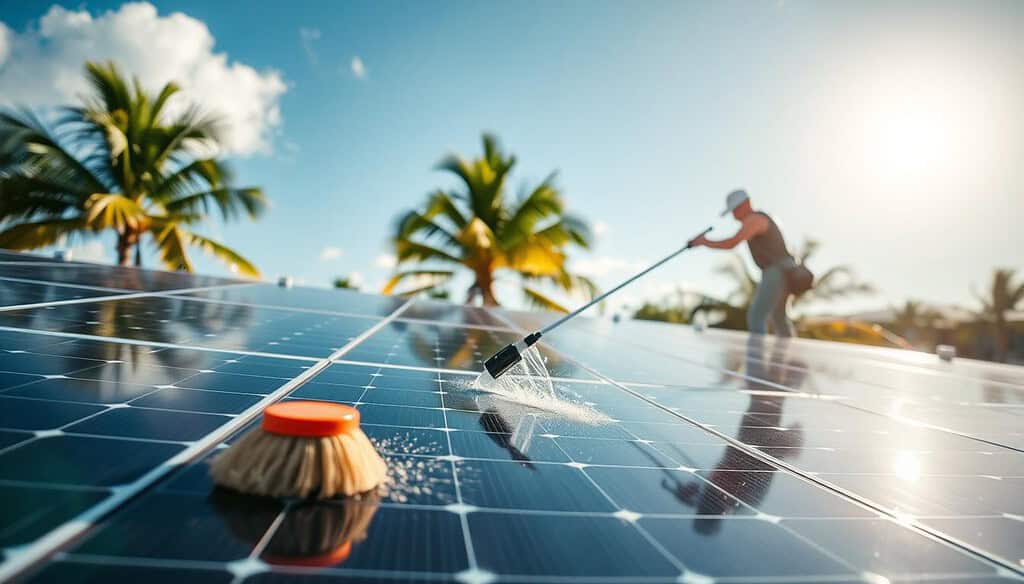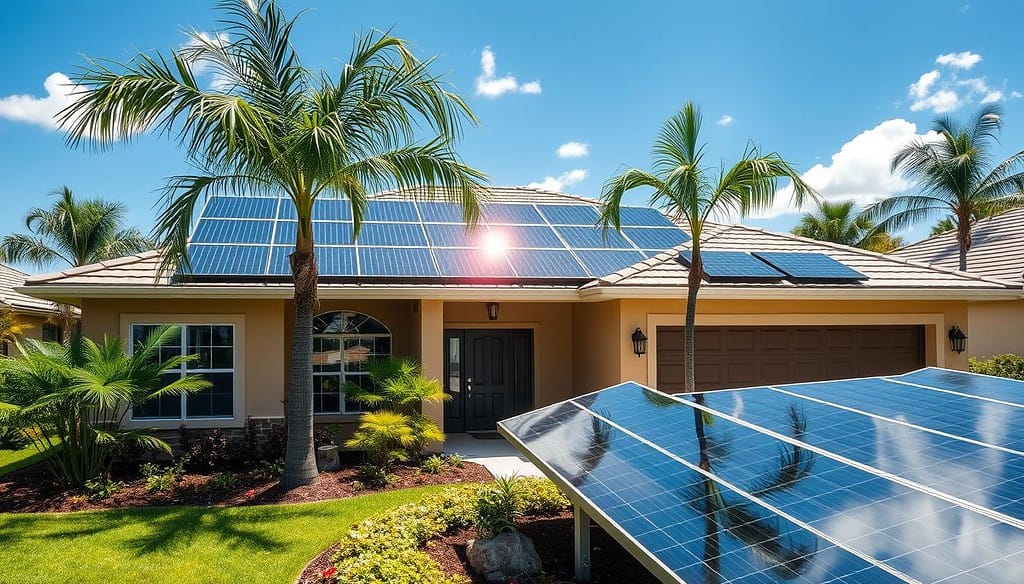Florida is known as the Sunshine State, making it perfect for solar energy. With 230-250 sunny days a year, homeowners can save a lot. A 14.06 kW solar panel system costs about $30,738 before any discounts.
But, after a 30% federal tax credit, the price goes down to around $21,517. This makes solar panels a great choice for many Floridians.
More than 79,000 homeowners in Florida have used EnergySage to find the best solar deals. Solar panels can save money in about 7.74 years. They last at least 25 years, offering long-term savings and a cleaner environment.
Key Takeaways
- Florida’s sunny climate makes it an ideal location for solar energy
- The average Florida homeowner needs a 14.06 kW solar panel system, costing around $30,738 before incentives
- After the 30% federal tax credit, the cost of a solar panel system in Florida drops to about $21,517
- Solar panels in Florida can pay for themselves in approximately 7.74 years
- Over 79,000 Florida homeowners have used EnergySage to compare solar installation quotes
Understanding Solar Power in the Sunshine State
Florida is leading the way in renewable energy, with solar power being key. It’s known as the “Sunshine State” because of its endless sunlight. This makes it perfect for using the sun’s energy.
Florida’s Solar Energy Potential
In 2018, Florida’s solar power grew by 50%. This move made it a top state for solar energy. The Inflation Reduction Act (IRA) now offers tax credits for up to 30% of solar panel costs. This makes solar panels more affordable than ever.
Benefits of Going Solar in Florida
- Use the state’s net metering policy to offset energy use with solar power up to 2 MW.
- Help Florida reach its goal of 30% renewable energy by 2030, matching the IRA’s net-zero emissions target by 2050.
- Enjoy lower solar panel costs thanks to the 2022 IRA bill, making solar more affordable for Floridians.
Current State of Solar Adoption
Florida’s solar market is booming, with a 20% rise in residential solar in 2016. Solar installations are expected to keep growing as panel costs drop. Despite no renewable energy standard, net metering is crucial for solar adoption.
As the second-largest state for solar capacity, Florida is ready to use its sunshine. With good policies, falling solar costs, and a strong solar industry, Florida is moving towards a greener future.
Solar Panels Cost in Florida
In Florida, the cost of solar panels is key when deciding to use solar energy. Prices range from $10,300 to $12,600, with each watt costing between $2.70 and $3.00. This initial cost might seem high, but the long-term savings and benefits are worth it for homeowners.
The size of your solar system affects the cost. Bigger systems, from 5 to 10 kW, cost more. A 5 kW system in Florida costs about $10,934. But, the federal Solar Investment Tax Credit (ITC) can help by covering 30% of the cost, lowering what you pay upfront.
The time it takes to get your money back is also important. In Florida, it usually takes around 10.56 years. This is due to savings on energy, net metering, and available incentives.
| System Size | Average Cost | Cost After 30% Federal Tax Credit |
|---|---|---|
| 3 kW | $7,740 | $5,418 |
| 5 kW | $10,934 | $7,654 |
| 10 kW | $21,868 | $15,308 |
The cost of solar panels in Florida can change based on several factors. These include the type of panels, installation costs, financing, and local electricity rates. By researching, comparing prices, and using incentives, you can get the most out of your solar investment. This way, you can enjoy the benefits of clean, renewable energy in Florida.
Federal Solar Tax Credit and Incentives
Going solar in Florida offers many financial benefits. One key advantage is the federal solar tax credit. This lets homeowners deduct 30% of their solar system’s cost from their taxes.
30% Federal Tax Credit Explained
The Solar Investment Tax Credit gives you a 30% tax credit. This covers the cost of panels, inverters, batteries, and installation. You can claim this credit on your federal taxes, lowering your solar system’s cost.
Property Tax Exemption
Florida also has a property tax exemption for solar systems. This means your solar system won’t raise your property taxes. You get a 100% exemption on the solar system’s value.
Sales Tax Benefits
Florida also doesn’t charge sales tax on solar equipment. This saves you 6% on the total cost of your solar system. It’s a big savings on your solar investment.
| Incentive | Description | Savings |
|---|---|---|
| Federal Solar Tax Credit | 30% deduction on total solar system cost | $9,000 on a $30,000 system |
| Property Tax Exemption | 100% exemption on solar property value | Varies based on property value |
| Sales Tax Exemption | 6% savings on solar equipment purchases | $1,800 on a $30,000 system |
These incentives make solar energy in Florida very attractive. They help reduce the initial cost and speed up your return on investment.
Florida Net Metering Policies
If you’re a Florida homeowner thinking about solar, you’ll be happy to know the state’s net metering policy is great. This policy lets your utility company give you full credit for any extra energy your solar system makes. This energy is sent back to the grid.
Here’s how Florida’s net metering works:
- The credits you earn are in kilowatt-hours (kWh), not dollars. They carry over each month.
- At the end of your annual “true-up” period, any leftover credits are paid out at a lower rate. This rate is usually 3-5 cents per kWh.
- Florida’s net metering law applies to customers of the state’s four major investor-owned utilities (IOUs). These utilities serve about 79% of residents.
Florida doesn’t have a statewide cap on net metering, but some local utilities and electric cooperatives might have their own rates. Overall, the state’s net metering rules help homeowners lower their utility bills. They also make the most of their grid connection and excess energy credits.
“Florida’s net metering law has been a crucial driver of the state’s growing solar market. By enabling homeowners to receive full retail-rate credit for their excess solar generation, it makes going solar more accessible and financially rewarding.” – Florida Solar Energy Industries Association
Even with a strong net metering policy, Florida’s rooftop solar adoption is still low. As of 2020, it only made up 0.16% of the state’s total electricity sales. But, a recent veto of a bill that would have ended net metering shows lawmakers are still backing solar growth and consumer choice.
Average Solar System Size Requirements
When thinking about solar power for your Florida home, figuring out the right system size is key. Most Florida homeowners need a 5-kilowatt (kW) solar panel system. This size can produce over 4,250 watts monthly, enough for the average American household.
Calculating Your Home’s Solar Needs
To find the best solar system size for your home, look at your energy use, roof space, and how much energy you want to save. You want a system that meets your needs and gives you a good return on your investment.
- Check your past energy bills to see how much electricity you use on average.
- Measure your roof space for solar panels, considering any shading or obstructions.
- Choose how much of your energy you want to get from solar power, usually 80-100%.
Power Output Considerations
In 2024, the top solar panels can make about 400 watts in full sun. It’s important to pick a system that matches your energy needs. The right size ensures your system works well and gives you a good return on your investment.
| Metric | Value |
|---|---|
| Average Home Energy Consumption (Annual) | 10,500 kWh |
| Average Home Energy Consumption (Monthly) | 875 kWh |
| Typical Solar System Size | 5 kW |
| Solar Panel Efficiency (2024) | 400 watts |
By thinking about your energy use, roof space, and energy savings goals, you can pick the right solar system size. This ensures your system meets your needs and helps you save money on energy.
Solar Installation Process in Florida
Starting your solar journey in Florida means going through a detailed installation process. You’ll work with skilled solar installers who will help you every step of the way. They make sure you get to clean, green power smoothly and efficiently.
- Initial Consultation and Site Assessment: Your installer will check your property to see how well it can use solar energy. They look at your roof, any shadows, and how much space you have. This helps them design the best system for you.
- System Design and Proposal: After checking your site, your installer will make a custom system design for you. They’ll give you a detailed plan that shows what your system will do, how much energy it will make, and how much you’ll save.
- Permitting and Approvals: Getting the right permits and approvals is key. Your installer will take care of this. They make sure your system follows all local rules and codes.
- Equipment Procurement: Once you have the permits, your installer will buy the needed parts. This includes solar panels, inverters, and mounting gear. Then, they can start setting up your system.
- Installation: Putting in your solar system usually takes 1-2 days. It depends on how big and complex your system is. Your installer’s team will make sure everything is installed right and works well.
- Inspection and Utility Connection: After it’s all set up, your system gets checked by local officials. If it passes, your utility company will connect it to the grid. Then, you can start using your own solar energy.
- System Activation: The last step is turning on your solar system. Your installer will show you how to do this. This makes sure your system is working right and you can enjoy the benefits of solar power.
The whole installation timeline can take a few weeks to a few months. A good local solar installer in Florida will be with you every step of the way. They make sure the switch to solar is easy and stress-free.

“Going solar in Florida was a game-changer for our home. The installation process was straightforward, and our installer guided us every step of the way. We’re now enjoying the benefits of clean, renewable energy and significant savings on our utility bills.”
Solar Financing Options in Florida
Homeowners in Florida have many ways to finance solar panels. You can choose from paying cash, taking out a solar loan, or leasing. Each option has its own pros and cons. Knowing these can help you pick the best one for your budget and future plans.
Cash Purchase Benefits
Buying your solar system with cash saves you the most money in the long run. You get to own it, skip interest payments, and enjoy tax credits. But, it means a big upfront cost, which might be hard for some to afford.
Solar Loans and PACE Financing
Solar loans, like the PACE program, let you finance with little to no down payment. PACE loans are paid back through your property taxes, making it easy to get started. These loans can help you own your system and save money over time.
Solar Leases and Power Purchase Agreements (PPAs)
Solar leases and PPAs mean no money down. A third-party owns and maintains the system, and you pay for the electricity. This option is cheaper upfront but might not save as much money in the long run.
The right solar financing option for you in Florida depends on your financial goals and budget. Look at each option carefully to find the one that fits your needs and saves you the most money.
| Financing Option | Upfront Cost | Ownership | Long-Term Savings |
|---|---|---|---|
| Cash Purchase | High | You own the system | Highest |
| Solar Loans (including PACE) | Low or no money down | You own the system | High |
| Solar Leases and PPAs | No upfront cost | Third-party owns the system | Lower |
Choosing the right solar financing in Florida can greatly affect your savings and benefits. Think about your options carefully and pick the one that matches your financial goals and needs.
Return on Investment and Payback Period
Installing solar panels in Florida can be a great investment. On average, it takes 6 to 10 years to get back the cost. Some systems can pay off in just 5 years.
The cost of the system, how much energy you use, and electricity rates all play a role. Homeowners in Florida can save about $150 a month on their bills. Over 25 years, these savings add up to nearly $50,000, making solar a wise choice.
| Factor | Impact on ROI and Payback |
|---|---|
| System Cost | The average cost of solar power in Florida is $2.65 per watt before incentives, which can drop to $1.95 per watt after tax credits and other incentives are applied. |
| Energy Usage | The higher your energy consumption, the more you can save by offsetting utility bills with solar power. |
| Electricity Rates | Florida’s electricity prices have increased by 65.74% since 2000, with an average annual inflation rate of 4% – making solar an even more attractive investment. |
| Incentives | Florida offers a 30% federal tax credit, 6% sales tax exemption, and net metering, which can significantly improve the ROI and shorten the payback period. |
Once the system pays off, you get free electricity for about 25 years. Solar panels can also make your home more valuable. This can be a big plus if you sell your home in the future.
“Going solar in Florida can be a game-changer, with the potential to save thousands on your energy costs over the long term. The ROI and payback period make it a smart investment for homeowners looking to reduce their monthly bills and their environmental impact.”
Solar Equipment Quality and Selection
Choosing the right equipment is key when you decide to go solar in Florida. High-quality solar panels mean better efficiency and longer warranties, usually up to 30 years. The latest solar panels can produce up to 400 watts per panel, perfect for Florida’s sunny weather.
When picking an inverter, consider your options carefully. Florida homeowners can choose from string inverters, microinverters, and power optimizers. Each has its own benefits. Look at efficiency, durability, warranty, and how they degrade over time.
Top Solar Panel Brands
- Q Cell
- Panasonic
- REC Group
- Jinko Solar
Inverter Options
- String Inverters
- Microinverters
- Power Optimizers
High-quality solar equipment is vital for your system’s long-term success. Think about solar panel efficiency, inverter types, equipment warranties, and performance ratings. This way, your solar setup will give you reliable, affordable energy for years.
“Solar panels can power an entire home or reduce electricity bills, offering year-round savings with or without battery backup.”
Solar Panels in Florida: Location and Climate Factors
Florida’s geography and climate are key for using the sun’s power. Florida gets an average of 230-250 sunny days a year. This makes it great for solar energy. But, the weather, including humidity and extreme events, can affect solar panel efficiency.
It’s important to place solar panels right to get the most energy. Homeowners should think about shading from trees or buildings. By checking their property, Floridians can make sure their panels get the best solar irradiance.
Even though Florida is warm, modern solar panels work well in the heat. Weather patterns like heavy clouds or storms are less of a problem now. Solar tech has improved to handle these conditions better.
Working with skilled solar installers who know Florida’s climate is key. They help homeowners get the most out of their solar panels. This ensures the panels are placed for the best results.

“Embracing solar power in Florida helps reduce greenhouse gas emissions and decrease reliance on non-renewable energy sources.”
Finding Qualified Solar Installers
Installing solar panels needs a skilled and experienced installer. In Florida, picking the right solar company is key. Look for certified installers who know the state’s rules and weather.
Check out local solar companies and read their customer reviews. Focus on their installation skills, warranties, and support after the job. A good installer will help with plans, permits, and incentives.
| Top 5 Solar Companies in Florida for 2024 | Installer Ranking |
|---|---|
| Demand Construction, Solar Optimum, Affordable Solar, Roof & Air, Solaria Solar and Roofing, BeeGreen Solar & Roofing |
|
When picking solar installers, look at their experience, reviews, and certifications. Choose companies known for quality and service.
“Investing in a high-quality solar installation is the key to maximizing your long-term savings and energy efficiency.”
Choosing a skilled solar installer in Florida means a smooth setup. You’ll get the most from your solar system for years.
Solar System Maintenance Requirements
Keeping your solar panel system in good shape is key to its long-term performance. Solar systems need little upkeep, but proper care can greatly extend their life.
Regular Maintenance Tasks
Important regular tasks for your solar panels include:
- Panel cleaning: Clean your panels with a mild detergent and soft brush or cloth. This stops dust and debris from blocking energy production.
- Visual inspections: Check your panels for damage like cracks or discoloration. This helps spot problems early.
- System monitoring: Watch your system’s performance closely. This can help find any issues quickly.
Professional Service Schedule
Don’t forget to schedule annual or bi-annual professional maintenance checks. These thorough inspections usually cover:
- Inverter testing and diagnostics
- Wiring checks for wear or damage
- System performance checks
Many solar installers offer maintenance packages. They can also suggest local service providers. Taking care of your solar panels helps them last longer and keeps your investment safe.

In Florida, solar panel owners must protect their systems from intense UV radiation. This prevents slow damage that can reduce performance and efficiency over time.
Solar Battery Storage Options
Solar batteries are not a must-have in Florida because of the net metering policy. Yet, they can be very useful during power outages. They let homeowners use the sun’s energy even when the grid is down. This ensures they have power for important home needs.
The Tesla Powerwall is a popular choice, costing about $15,600 in Florida. But, adding a battery can make a solar system almost twice as expensive. This is without saving money under Florida’s net metering rules.
For those who want energy independence or live in areas with frequent power cuts, batteries might be a good idea. Most homes can manage with one or two batteries. These can power essential items during an outage.
| Battery Technology | Average Lifespan | Typical Cost in Florida |
|---|---|---|
| Lead-Acid | 5-10 years | $12,000 – $15,000 |
| Lithium-Ion | 7-15 years | $12,000 – $15,000 |
Solar batteries might not be the best financial choice in Florida. But, they can give peace of mind and keep power on during grid failures. Homeowners should think about the benefits of energy storage, backup power, and off-grid capabilities. They should also consider the extra costs of battery technologies when deciding on solar.
Property Value Impact of Solar Installation
Thinking about solar panels in Florida? You’ll be happy to know they can really up your home’s value. Studies show homes with solar systems sell for more than those without in the Sunshine State.
Homes with solar panels in Florida sell for about 4% more, which is around $9,454 more. This is because people love energy-efficient homes. For every dollar saved on energy, your home’s value can increase by $20.
The value boost from solar panels depends on several things. This includes the system’s size, age, and the local real estate market. For example, in St. Augustine, solar panels can add at least $15,000 to your home’s value. In Jacksonville, a 5 kWh system can add over $18,000.
And there’s more good news. Florida’s Property Tax Abatement incentive means your property taxes won’t go up. This lets you enjoy the higher home value without worrying about taxes.
Florida is attracting more people, and there’s a growing need for energy-efficient homes. Solar panels can give you a big real estate benefit and increase your home value when you sell.

“Homes with solar panels in Florida sell for approximately 4.1% more than comparable non-solar-equipped homes.”
Building Permits and Regulations
Installing solar panels in Florida means you have to deal with local permits and building codes. Each area has its own rules, but knowing what to do can make the process easier.
Local Permit Requirements
In Florida, most places need permits for solar panel setups. You’ll need to show detailed plans and engineering documents for the mounting. Solar water heaters usually get a plumbing permit, which is faster.
Solar pool heaters might need permits too, because they involve structure, plumbing, and electricity. Remember, some places don’t need permits for small repairs or replacements. But, not getting the right permits can cause problems later.
HOA Considerations
Florida law says HOAs can’t stop you from getting solar panels. But, they might have rules about where and how they look. Make sure your solar panels fit your HOA’s rules and still work well.
Knowing about permits and HOA rules helps Florida homeowners set up solar panels smoothly. This way, they can enjoy the benefits of clean energy at home.
Monitoring Solar System Performance
If you live in Florida and have solar panels, it’s important to watch how they perform. Modern solar tech lets you track energy production in real-time. You can do this through apps or web portals that are easy to use.
By monitoring your solar system regularly, you can spot problems quickly. This ensures it works at its best. Advanced systems give you detailed analytics and alerts for maintenance, helping you make smart choices about your energy use.
With remote monitoring, you can check your solar panel’s performance from anywhere. This lets you track energy generation and find any issues. It’s key for getting the most out of your solar investment in Florida.
Many solar systems in Florida also offer remote monitoring. This lets you check your energy production from anywhere. It’s a handy feature that helps you quickly fix any problems that might affect your system’s efficiency optimization.
“Proper monitoring and maintenance of my solar panels have helped me save hundreds on my monthly electricity bills. I’m able to track performance and identify any problems right from my smartphone.”
By keeping an eye on your solar system’s performance, you can save a lot on energy costs. You’ll also cut down on maintenance expenses. This way, your investment in renewable energy will keep giving you benefits for many years.
Conclusion
Solar energy in Florida brings many benefits to homeowners. You can save a lot on energy costs and even see your property value go up. The state’s sunny weather, good policies, and cheaper solar panels make it perfect for using the sun’s power.
Getting solar panels and home batteries means you can be energy independent. You’ll also have power when storms hit. Plus, you’ll help the planet. The federal Investment Tax Credit (ITC) and net metering policies in Florida make going solar a wise choice.
The solar market in Florida is growing fast, and the tech is getting better. Solar power is a great way to cut down on electricity bills, lessen your carbon footprint, and boost your home’s value. It’s a smart move towards a greener, more sustainable life.
